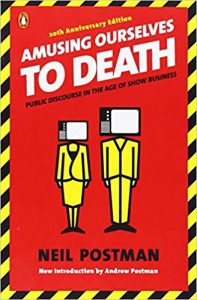Amusing Ourselves to Death
Neil Postman (1985)
 Postman distinguishes the Orwellian vision of the future, in which totalitarian governments seize individual rights, from that offered by Aldous Huxley in Brave New World, where people medicate themselves into bliss, thereby voluntarily sacrificing their rights. Drawing an analogy with the latter scenario, Postman sees television’s entertainment value as a present-day “soma”, the fictitious pleasure drug in Brave New World, by means of which the citizens’ rights are exchanged for consumers’ entertainment.
Postman distinguishes the Orwellian vision of the future, in which totalitarian governments seize individual rights, from that offered by Aldous Huxley in Brave New World, where people medicate themselves into bliss, thereby voluntarily sacrificing their rights. Drawing an analogy with the latter scenario, Postman sees television’s entertainment value as a present-day “soma”, the fictitious pleasure drug in Brave New World, by means of which the citizens’ rights are exchanged for consumers’ entertainment.
The essential premise of the book, which Postman extends to the rest of his argument(s), is that “form excludes the content,” that is, a particular medium can only sustain a particular level of ideas. Thus rational argument, integral to print typography, is militated against by the medium of television for this reason. Owing to this shortcoming, politics and religion are diluted, and “news of the day” becomes a packaged commodity. Television de-emphasises the quality of information in favour of satisfying the far-reaching needs of entertainment, by which information is encumbered and to which it is subordinate.
